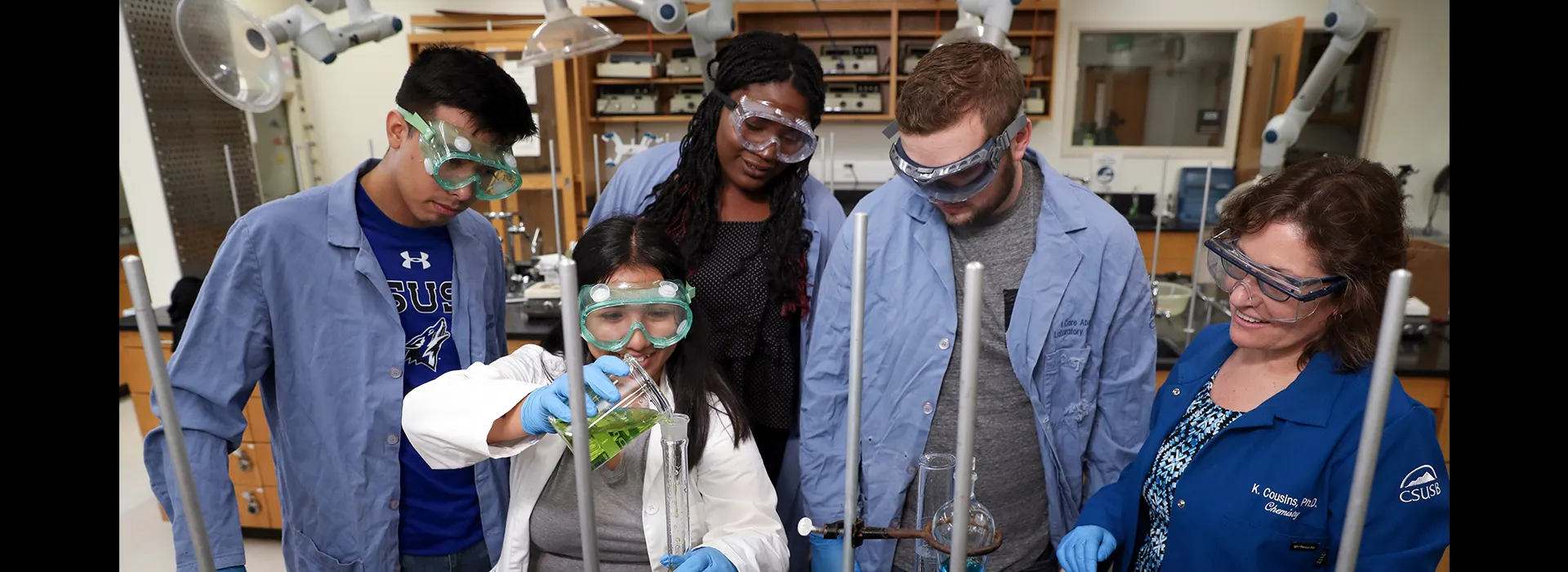Joe Gutierrez Office of Strategic Communication 909-537-5007 joeg@csusb.edu

Cal State San Bernardino has received a National Science Foundation (NSF) grant of nearly $1 million to increase the number of female and underrepresented minority faculty in its science, technology, engineering and mathematics (STEM) departments. The NSF grant, ADVANCE – Increasing the Participation and Advancement of Women in Academic Science and Engineering Careers – is a result of the findings of a special CSUSB Diversity and Equity in Promotion, Tenure and Hiring (DEPTH) task force, commissioned to identify the causes of inequities in STEM participation of faculty. The NSF grant will be used in several areas to facilitate a culture of equity and diversity within the faculty through comprehensive policy changes at CSUSB concerning recruitment, hiring, promotion and tenure regarding STEM-related programs, said university President Tomás D. Morales. “The ADVANCE grant will help CSUSB not only increase the number of female and underrepresented minorities teaching STEM courses, but also help the university introduce and implement new policies and procedures to ensure hiring, recruiting and tenure processes that are equitable,” said Morales. “I had the opportunity to work with colleagues implementing an ADVANCE grant while serving as provost at Cal Poly Pomona and saw firsthand the positive impact it can have on the professional development of faculty.” The need to increase female faculty members in STEM courses was evident as CSUSB worked to increase student graduation rates while fostering gender and ethnic equity of students in STEM programs. As the student numbers increased, faculty hires did not keep pace due to a downturn in economic conditions nationwide. The increased focus to adopt comprehensive approaches to greater inclusion within STEM faculty is a major commitment. Currently, CSUSB is ideally poised for those changes as it is already in the midst of a major transition of converting by 2020 from a quarterly system to a semester system (Q2S), said Provost McMahan. “Cal State San Bernardino can capitalize on an already changing infrastructure and introduce new transformative policies and procedures,” said McMahan. “Also, because the change to a semester system reflects changes in institutional values, the Q2S conversion has renewed focus on our commitment to inclusion.” The grant’s co-principle investigators include three psychology department faculty: associate professor Donna Garcia, and assistant professors Cari Goetz and Joseph Wellman. Karen Kolehmainen, professor of physics and chair of the faculty senate, is also serving as a co-principal investigator. Garcia will serve as executive director of the newly created DEPTH Office at CSUSB, which will undertake the activities put forth in the ADVANCE grant proposal. “Both the university’s administration and faculty senate agree that there is an urgent need to diversify and rectify inequity with the faculty, especially in STEM departments,” said Garcia. The DEPTH plan is comprehensive and proposes a multi-pronged approach to fostering diversity and equity. Policy initiatives will include:
- Establishing data tracking policies and practices to track applicant and faculty data to better understand current inequities in STEM to improve future understanding of the issues;
- Developing trainings directed at achieving diverse applicant pools, conducting effective faculty searches and avoiding biases in the recruitment and hiring processes; and
- Creating tenure-track faculty evaluation policies and training that follow current best-practices for achieving equity, such as implementing standardized faculty evaluation criteria and training for evaluators.
Garcia said because the role of CSUSB faculty is essential, the DEPTH team will form partnerships with the faculty senate, the campus chapter of the California Faculty Association, Title IX, the President’s Council on Diversity, Inclusion and Equity (CODIE) and the University Diversity Committee, as well as other faculty interest groups. Furthermore, faculty will be key in developing the evaluation criteria for faculty applicants and current faculty going through the promotion and tenure processes. “Faculty know best what their department needs and what evaluation criteria are most relevant in their discipline,” Garcia said. “Different departments have different goals, and it is paramount that we hear from faculty across the university as we develop our new policies and procedures.” Garcia emphasized that collaboration with STEM departments will also be key. “The DEPTH team is excited to work with Sastry Pantula, dean of the College of Natural Sciences, to achieve the ADVANCE goals.” The National Science Foundation created the ADVANCE grant because despite significant increases in the proportion of women pursuing STEM doctoral degrees, women are significantly underrepresented as faculty, particularly in upper ranks, and in academic administrative positions, in almost all STEM fields. According to the NSF, the problems of recruitment, retention, and advancement that are the causes of this underrepresentation vary by discipline and across groups of women faculty (e.g., by race/ethnicity, disability status, sexual orientation, foreign-born and foreign-trained status, and faculty appointment type). In 47 states, the District of Columbia and Puerto Rico, more than 160 different institutions of higher education and nonprofit organizations have received ADVANCE grants totaling over $270 million between 2001 and 2016. For more information on the CSUSB ADVANCE grant and the DEPTH program, contact Donna Garcia at dmgarcia@csusb.edu. For more information on Cal State San Bernardino, contact the university’s Office of Strategic Communication at (909) 537-5007 and visit the Inside CSUSB website.